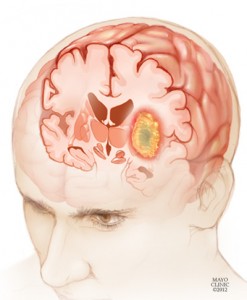-
 Cancer
CancerLonger Telomeres, Considered Sign of Good Health, Linked to Brain Cancer Risk
 Research conducted by Mayo Clinic investigators has found that two common gene variants that lead to longer telomeres — the caps on chromosome ends thought by many scientists to confer health by protecting cells from aging — also significantly increase the risk of developing gliomas, a deadly form of brain cancer.
Research conducted by Mayo Clinic investigators has found that two common gene variants that lead to longer telomeres — the caps on chromosome ends thought by many scientists to confer health by protecting cells from aging — also significantly increase the risk of developing gliomas, a deadly form of brain cancer.
The genetic variants, in two telomere-related genes known as TERT and TERC, are respectively carried by 51 percent and 72 percent of the general population. Because it is somewhat unusual for such risk-conferring variants to be carried by a majority of people, the researchers propose that, in these carriers, the overall cellular robustness afforded by longer telomeres trumps the increased risk of high-grade gliomas, which are invariably fatal but relatively rare.
The research was published online in the journal Nature Genetics.
 “There are clearly high barriers to developing gliomas, perhaps because the brain is specially protected,” says Robert Jenkins, M.D., Ph.D., a pathologist at Mayo Clinic. “It’s not uncommon for people diagnosed with glioma to comment, ‘I’ve never been sick in my life.’”
“There are clearly high barriers to developing gliomas, perhaps because the brain is specially protected,” says Robert Jenkins, M.D., Ph.D., a pathologist at Mayo Clinic. “It’s not uncommon for people diagnosed with glioma to comment, ‘I’ve never been sick in my life.’”
In the first phase of the new study, researchers at Mayo Clinic and the University of California San Francisco analyzed genome-wide data from 1,644 glioma patients and 7,736 healthy control individuals, including some who took part in The Cancer Genome Atlas project sponsored by the National Cancer Institute and National Human Genome Research Institute. This work confirmed a link between TERT and gliomas that had been made previously; they also identified TERC as a glioma risk factor for the first time.
Since both genes have known roles in regulating the action of telomerase, the enzyme that maintains telomere length, the research team combed a massive genomic analysis of telomere length in nearly 40,000 individuals conducted at the University of Leicester in the United Kingdom and found that the same TERT and TERC variants associated with glioma risk were also associated with greater telomere length.
“So, though longer telomeres may be good for your whole person by reducing many health risks and slowing aging, they might also cause some cells to live longer than they’re supposed to, which may predispose someone to cancer,” Dr. Jenkins says.
Dr. Jenkins says the relevance of the new research should extend beyond gliomas, since similar TERT variants have also been implicated in lung, prostate, testicular and breast cancers, and TERC variantsin leukemia, colon cancer and multiple myeloma.
In addition to Mayo Clinic, research for this study was conducted at the University of California San Francisco, the University of Leicester in the United Kingdom and the University Medical Center Groningen in the Netherlands.
About Mayo Clinic Cancer Center
As a leading institution funded by the National Cancer Institute, Mayo Clinic Cancer Centerconducts basic, clinical and population science research, translating discoveries into improved methods for prevention, diagnosis, prognosis and therapy. For information on cancer clinical trials, call 855-776-0015 toll free.
###
AboutMayo Clinic
Recognizing 150 years of serving humanity in 2014, Mayo Clinic is a nonprofit worldwide leader in medical care, research and education for people from all walks of life. For more information, visit 150 years.mayoclinic.org, http://www.mayoclinic.org/ and newsnetwork.mayoclinic.org.
MEDIA CONTACT:
Joe Dangor, Mayo Clinic Public Affairs, 507-284-5005, newsbureau@mayo.edu







